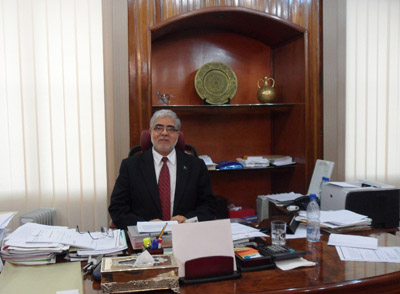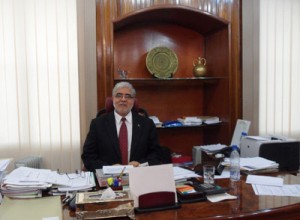Mustafa Abushagur has been much in the news this past week following the arrest of Abdullah Senussi in . . .[restrict]Mauritania. Immediately afterwards, he flew to the Mauritanian capital Nouakchott to negotiate with the Mauritanian government to hand Qaddafi’s spy chief over to Libya. Umar Khan interviewed the Deputy Prime Minister shortly before the arrest.
After living in exile for 31 years, Mustafa Abushagur returned to Benghazi in May last year. He was part of a delegation of senior opposition members from the western region who supported the National Transitional Council (NTC) and opposed the idea that the NTC should be a group of people representing eastern Libya only.
Abushagur has a strong background in academia as well as industry. Apart from being a professor, he owns a number of companies and has chaired many civil organizations in the United States. He was appointed deputy prime minister in November when the transitional government was announced.
Despite his busy schedule, he was kind enough to spare some time for this interview. I asked him about the difficult task of holding free and fair elections as scheduled and if he sees the elections happening.
The date of the elections have become a matter of speculation; with only a few months to go, there are several points that still need to be clarified. The lack of clear progress has led to rumors that the elections may be postponed for a few months but the deputy prime minister seemed very optimistic, “It is tough but possible.”
On the much-debated matter of not allowing the military to vote, he is firm. “The military will not be allowed to vote in the transitional phase but this will be discussed later in the elected congress,” he said.
He was skeptical about the law that bars the NTC and transitional government members from standing in the elections. “It is the choice of the members not to participate in the elections, but they should be allowed to if they want to. I myself have no intentions of participating in the elections,” he said.
About leaving office after the elections, he said, “I’m very anxious to hand over this office to an elected member.”
He said that he was “against dividing the country on a geographical basis; the electoral districts should be based on population and area.”
He was satisfied with the improvement in the security situation. “Security is not optimum but there has been a great improvement over the past few months.” He is happy with the increase of police presence on the streets, saying it is a “very encouraging sign”.
When asked about the presence of different brigades in the capital, he said that the government was facing challenges dealing with people “claiming to be revolutionaries” and that the Ministry of Interior was trying its best to apprehend all the criminals who were released by Qaddafi at the beginning of the revolution last year. He added that “some of these are wearing camouflage uniforms and holding weapons.”
“We also have other options on the table,” he said, regarding the few brigades who have, so far, refused to leave the capital. “However some of them are very closely monitoring the security situation and helping the government,” he added.
Discussing Bani Walid, he said: “It is a part of Libya like any other city. The Libyans will have to realize that we cannot live in the past and we have to move forward.” He also said that there were ongoing negotiations concerning criminals hiding in the city. “We want them to help us by bringing them to justice and we will give all of them a fair trial. We don’t want to kill them.” He was very clear about not using force and said: “We don’t want to use force although we can but we don’t want any more bloodshed.”
“Libya is a country and nobody has the right to destroy anything they don’t like or don’t agree with,” he said referring to the stand-off in Zliten earlier this month when hardline Salafis wanted to destroy a Sufi shrine. He added: “Sheikh Sadeq Ghariani has already condemned the action and I don’t think he will go back on his word and issue a new fatwa on the same issue.”
Abushagur confirmed that some of the courts had started functioning and that the government was working on a plan to provide security for judges to avoid any possible problems after they deliver verdicts in controversial cases. “There was no judiciary in Qaddafi’s time and it will take some time to establish an independent judicial system in Libya,” he said.
Answering a question about the formation of the national army, he simply said: “We’ve had limited success with the formation of the national army.”
When asked about the progress of the interim government, he said: “The government has done a reasonable job considering the fact that we were facing a series of challenges.” He also added: “There are few achievements that are visible to ordinary people but there are many that will take time for them to see.”
He agreed that there was frustration in public circles. “I’m aware of our weaknesses; despite all our efforts, our media is not efficient enough. Both the slowness in forming the national army and the level of security are not where we want them to be.”
He emphasised that the level of transparency of the transitional government was exceptional. “We publish our minutes of meetings, plans and the CV’s of ministers. There are not many governments in the world who do this.”
I asked him about his appointment in the interim government and why he had accepted it. He answered that it was an honour to serve the country. “I didn’t want to let the Libyan people down but I never desired this role.”
When asked if he would accept an extension in office, he replied that he was anxious to leave. “I want to leave a healthy tradition of sticking to deadlines.”
When asked what he thought Libya needed most at this time, he said decisively “patience”.
“We are moving from the phase of revolution to nation building and this takes time. We should express opinions freely but in a civilized manner.”
I asked if he thought that some people were trying to hijack the February 17 Revolution and he responded: “That is obvious and it happens everywhere. Some people are trying to spread chaos for personal interests so everybody has to remain alert and stop them.”
Umar Khan can be found at twitter.com/umarnkhan
[/restrict]









